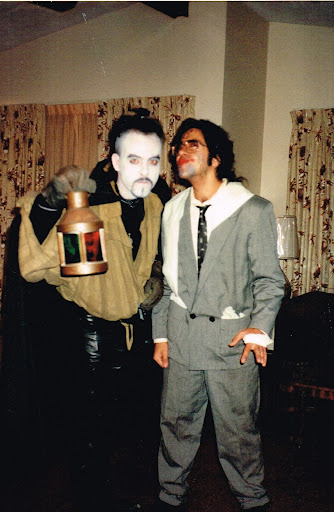Yup.

Yup.

Two years ago today, in a moment of Christmas-induced depression, I started this blog. I meant for it to be a place where I could go and spill out the insanity in my head so I could carry on with life.
In short order, it snowballed into much more than that.
Mood music:
http://youtu.be/IKpEoRlcHfA
About a year into my recovery from serious mental illness and addiction — the most uncool, unglamorous addiction at that — I started thinking about sharing where I’ve been. My reasoning was simple: I’d listened to a lot of people toss around the OCD acronym to describe everything from being a type A personality to just being stressed. I also saw a lot of people who were traveling the road I’d been down and were hiding their true nature from the world for fear of a backlash at work and in social circles.
At some point, that bullshit became unacceptable to me.
I started getting sick of hiding. I decided the only way to beat my demons at their sick little game was to push them out into the light, so everyone could see how ugly they were and how bad they smelled. That would make them weaker, and me stronger. And so that’s how this started out, as a stigma-busting exercise.
Then, something happened. A lot of you started writing to me about your own struggles and asking questions about how I deal with specific challenges life hurls at me. The readership has steadily increased.
Truth be told, life with THE OCD DIARIES hasn’t been what I’d call pure bliss. There are many mornings where I’d rather be doing other things, but the blog calls to me. A new thought pops into my head and has to come out. It can also be tough on my wife, because sometimes she only learns about what’s going on in my head from what’s in the blog. I don’t mean to do that. It’s just that I often can’t form my thoughts clearly in discussion. I come here to do it, and when I’m done the whole world sees it.
More than once I’ve asked Erin if I should kill this blog. Despite the discomfort it can cause her at times, she always argues against shutting it down. It’s too important to my own recovery process, and others stand to learn from it or at least relate to it.
And so I push forward.
One difference: I run almost ever post I write by her before posting it. I’ve shelved several posts at her recommendation, and it’s probably for the best. Restraint has never been one of my strengths.
This blog has helped me repair relationships that were strained or broken. It has also damaged some friendships. When you write all your feelings down without a filter, you’re inevitably going to make someone angry.
One dear friend suggested I push buttons for a good story and don’t know how to let sleeping dogs lie. She’s right about the sleeping dogs part, but I don’t agree with the first suggestion. I am certainly a button pusher. But I don’t push to generate a good story. I don’t set out to do that, at least.
Life happens and I write about how I feel about it, and how I try to apply the lessons I’ve learned. It’s never my way or the highway. If you read this blog as an instruction manual for life, you’re doing it wrong. What works for me isn’t necessarily going to fit your own needs.
Over time, the subject matter of this blog has broadened. It started out primarily as a blog about OCD and addiction. Then it expanded to include my love of music and my commentary on current events as they relate to our mental state.
I recently rewrote the “about” section of the blog to better explain the whole package. Reiterating it is a pretty good way to end this entry. You can see it here.
Thanks for reading.

This week I’ve been in Los Angeles on business. But I’ve been slaying some old demons while here.
Mood music:
Let’s go back 20 years — July 1991 — when I came out here with Sean Marley on my first trip to the west coast. I didn’t really want to go because I was afraid of everything and everyone. But Sean was red hot about the idea, and back then I was always out to impress the man. So off we went, on a 10-day California trip that would take us as far north as Eureka and as far south as Los Angeles. We lived in the rental car the whole time except for L.A., where we stayed in a friend’s apartment.
In L.A., we hooked up with a guy who used to live in the Point of Pines in Revere. I didn’t remember him, but he and Sean were tight as kids. Michael was his name. Michael took us to visit a couple of his friends who were living the stereotypical Hollywood lifestyle. They had a band, but sat in their cramped bungalow all day, surrounded by towers of empty beer cans and cigarette boxes, watching all the bad daytime TV they could feast their eyes on.
One of them asked me where we were from. The Boston area, I told him.
“Dude,” he said through the cloud of cigarette smoke encircling his head. “That’s a pretty long way from here.”
The statement filled me with more terror.
A pretty long way from here. From my safe place in the basement apartment at 22 Lynnway, Revere, Mass.
Terror.
That’s pretty much what the trip was. Sean ate it all up and had the time of his life, despite me.
I didn’t know back then that I suffered from OCD-induced fear and anxiety. I was still many years away from the therapy, medication and spiritual conversion. I had no idea what the 12 steps were when I was 21. Too bad, because I SHOULD have had the time of my life on that trip, too.
But that’s what fear does. It robs you blind. Robs you of everything that should make life worthwhile.
Fast-forward to the present. I’m back in LA on business. But I decided I was going to do a few things I couldn’t do last time I was here because of the fear.
I rented a car and drove all over Los Angeles and went as far south as Orange County, using the same freeways that scared the daylights out of me back then.

I took walks all over the place and mingled freely with people — something else I was afraid to do before.
I went deep into the Hollywood Hills and drove to some old murder sites because as a kid these places left me obsessed and afraid. The Manson Murders was particularly scarring on my young mind. From the first time I saw the TV movie “Helter Skelter” in the late 1970s through the first time I read the book from beginning to end in the 1980s it’s been the stuff of nightmares. That has fed the obsessive part of me. I read that book two or three times a year and knew exactly where every murder scene was before setting foot on the plane.
So I traveled to Cielo Drive, where Sharon Tate and her friends were murdered, and Waverly Drive a half-hour away, where Leno and Rosemary LaBianca were murdered the following night.



I also visited the scene of the Wonderland Murders.

Along the way, I visited the Sunset Strip, the cradle of Rock ‘N Roll History.


Driving in strange places scares me less and less the more I do it. This was a big step in slaying the old fears.
The scary glow of the Manson Murders was also dimmed considerably this trip. When you look across the canyon to where the Tate-Polanski house once stood, the scene is peaceful. Driving to the gate of where the murders happened killed the mystique for me.
I think I’ll put the old “Helter Skelter” book away now.
The lesson of this post is that facing fears is sometimes the only way to slay them. I did the hardest work on myself long before this trip. But the journey has been the icing on that cake.
When you learn to manage your fears, a whole new world is opened up before you.
If more than one member of the same family is in therapy, is that a sign that the family is seriously screwed up?
Mood music:
http://youtu.be/iFAweWkqqjk
That’s the question we are asking ourselves these days. As the reader knows by now, I’ve been in therapy for OCD and related issues for seven years. Duncan sees a children’s therapist to help him work through his ADHD.
Is this family a basket case? In my opinion, it’s exactly the opposite.
I wouldn’t be enjoying the equilibrium I have today if not for the years of therapy.
Meanwhile, Duncan is learning a lot of helpful techniques to help him focus and control his anger.
I’m a staunch advocate of therapy as a tool for mental health. I think too many people are embarrassed when it’s suggested that therapy would do them some good. People who stay away from therapy because they feel it’s a mark of weakness have no idea what they are denying themselves. That makes me sad.
It’s a funny thing when I talk to people suffering from depression, addiction and other troubles of the mind. Folks seem more comfortable about the idea of pills than in seeing a therapist. After all, they’re just crazy “shrinks” in white coats obsessed with how your childhood nightmares compromised your adult sex life, right?
I’ve been to many therapists in my life. I was sent to one at Children’s Hospital in Boston as a kid to talk through the emotions of being sick with Chron’s Disease all the time. That same therapist also tried to help me and my siblings process the bitter aftermath of our parents’ divorce in 1980.
As a teenager, I went to another therapist to discuss my brother’s death and my difficulty in getting along with my stepmother (a wonderful, wonderful woman who I love dearly, by the way. But as a kid I didn’t get along with her).
That guy was a piece of work. He had a thick French accent and wanted to know if I found my stepmother attractive. From the moment he asked that question, I was done with him, and spent the rest of the appointment being belligerent.
That put me off going to a therapist for a long time. I started going to one again in 2004, when I found I could no longer function in society without untangling the barbed wire in my head. But I hesitated for a couple years before pressing on.
The therapist I started going to specialized in dealing with disturbed children and teenagers. That was perfect, because in a lot of ways I was still a troubled kid.
She never told me what to do, never told me how I’m supposed to interpret my disorder against my past. She asked a lot of questions and had me do the work of sorting it out. That, ladies and gentlemen, is what a good therapist does. They ask questions to get your brain churning, dredging up experiences that sat at the back of the mind like mud on the ocean floor. That’s how you begin to deal with how you got to the point of dysfunction.
She moved to Florida a year in and I started going to a fellow who worked from his house. I would explain my binge eating habits to him, specifically how I would down $30 worth of McDonald’s between work and home.
“You should stock your car with healthy foods like fruit, so if you’re hungry you can eat those things instead,” he told me.
That was the end of that. He didn’t get it. When an addict craves the junk, the healthy food around you doesn’t stand a chance. The compulsion is specifically toward eating the junk. He should have understood. He didn’t. Game over, dumb ass.
The therapist I see now is a God-send. He was the first therapist to help me understand the science behind mental illness and the way an inbalance in brain chemistry can mess with your thought traffic. He also provided me with quite an education on how anti-depressants work. Yes, friends, there’s a science to it. Certain drugs are designed to shore up the brain chemicals that, when depleted, lead to bi-polar behavior. Other meds are specifically geared toward anxiety control. In my case, I needed the drug that best addressed obsessive-compulsive behavior. For me, that meant Prozac.
That’s not to say I blindly obey his every suggestion. He specializes in stress reduction and is big on yoga and eliminating coffee from the daily diet. Those are two deal breakers for me. Yoga bores the dickens out of me. If you’ve been following this blog all along, I need not explain the coffee part.
I also find it fun to push his buttons once in awhile. I’ll show up at his office with a huge cup of Starbucks. “Oh, I see you’ve brought drugs with you,” he’ll say.
Our relationship has settled into this banter back and forth, and it continues to serve its purpose. We go over everything happening in my life at that given moment, and if he suspects I’m thinking in unproductive ways or lying to myself, he calls me on it.
I’m better for it.
All that is the long way of saying I think it’s absolutely healthy if multiple members of one family are in therapy at the same time.

I’ve gotten word that a reader and dear friend was upset over last week’s post, “Reading Between The Lines Of A Bad Report Card.” She shouldn’t be.
Mood music:
http://youtu.be/qga5eONXU_4
She said that she would never have sent such a bad report card to her adult child. I think she was also upset at the suggestion that my parents weren’t paying adequate attention to me back then.
I don’t mind, though. In fact, I’m happy to have that old report card. It put things in perspective for me. It was a snapshot of a difficult time. I used to get angry when thinking about those days. I had a lot of hate in my soul over it.
I don’t feel that way anymore. I think everyone did the best they could with the tools they had back then. The problem was that the tools weren’t that great.
But everything turned out fine.
Below is the original post. Have a look and tell me if you would be upset if such a report card were sent to you.
And to my friend: I appreciate your reaction to the original post very much. Yours is a friendship I treasure, and I don’t want you to worry about this one. Hence the sequel post.
My mother found my fourth-grade report card the other day and mailed it to me. On the surface it shows a chronic C student who doesn’t give a damn about anything.
But when I read between the lines I can see exactly where my 10-year-old head was at.
If you look at it on the surface, you see a straight-C student who occasionally sinks to a D in social studies and math. On the back of the report card are comments each quarter from my teacher, describing me as a kid who puts no effort into anything.
My first thought on reading it was that this teacher didn’t like me, and that the feeling was mutual. In reality, I don’t think she disliked me. I think she saw a kid adrift and was trying to scare my parents into a more rigorous study routine at home.
Unfortunately for her and me, she wasn’t the type of teacher who was going to get through to me. She took the academics very seriously, but did little to appeal to the more creative side of me. Teachers before and after her would have a lot more success in that regard. She didn’t get me and I didn’t get her. A troubled kid needs nurturing personalities to intervene.
Even as an adult who has enjoyed a fair amount of career success it’s the same:The more nurturing bosses get more out of me. The ones who shove a 13-point plan in my face and tell me to do it get nothing but trouble. Luckily for me, I’ve only had a couple bosses like that along the way.
I have been both types of boss myself, and I’ve found that most people do better with supervisors who are nurturing souls.
In the 1980-81 school year at Theodore Roosevelt School in the Point of Pines, Revere, Mass., I needed a lot of nurturing.
My parents divorced in the summer of 1980 and it was not a civilized, amicable process. The yelling and instability sent me on to such soothing pursuits as lighting things on fire and shoving the garden hose into an air vent on the side of the house.
I was also sick most of the time with Crohn’s Disease. If you look at my attendance record, there’s a 20-plus day absence in the fourth quarter. That was for one of my extended hospital stays. I missed the class picture shoot that spring, which is probably for the best. I wasn’t a pleasant site.
Erin was pained to look at my report card. She never got grades so consistently bad. She felt sympathy for the teacher, who was obviously trying to get my parents’ attention. But in the raw wake of divorce and the illnesses me and my older brother suffered from, they obviously were distracted. I don’t blame them.
I suppose I should have felt sad looking at the report card, but I don’t. I see it for what it was — a snapshot of a difficult period of time. I survived it, and turned into an excellent student once I had a couple years of college under my belt. I would argue that despite it all, I turned out just fine.
What makes me even happier is that at least to date, my children do well academically. Duncan has some ADHD-related challenges, but his grades are mostly good and he has a heart I didn’t have at that age. That heart will take him far.
Sean is currently the same age I was when I brought home that report card. He’s razor-sharp academically, though like me at that age, he often rushes through his homework, the most notable evidence being his sloppy penmanship. We can work with that.
I’d like to think that their better academic luck reflects that we’re giving them a good home life — better than mine was, at least.
To me, the big lesson is that when a kid brings home a bad report card, it’s not enough to just look at the grades and brand the student a success or failure based on the letters and numbers alone.
There’s always a story behind the grades, and taking the time to know the story is key to helping that child going forward.
Fifteen years ago I lost the friend who had become my older brother and rudder. A vicious cycle of depression destroyed his body, but it failed to kill his soul.
Mood music:
For a lot of my more religious friends, that has to sound odd, if not foul. We’ve been taught that suicide is a mortal sin, the kind that sends the soul straight to hell. I used to believe that. Now I think that line of thinking is wrong, stupid and even a little dangerous. It makes us give up on people who were good to the core, whose only fault was an inability to climb out of the black fog depression smothers the mind with.
Here are a couple brief paragraphs on the day he died:
In the weeks leading up to his suicide, I knew he was badly depressed. I even had a feeling he harbored suicidal thoughts. I just never thought he’d do it. Or it could be that I thought I had more time to be there and help him through it. Instead, I stayed wrapped in my own world as he deteriorated.
On Nov. 15, 1996, he decided he’d had enough. It was a sparkling, autumn Friday and I was having a great morning at work. But early that afternoon, I got a call at work from my mother. She had driven by Sean’s house and saw police cars and ambulances and all kinds of commotion on the front lawn. I called his sister and she put his wife on the phone. She informed me he was dead. By his own hand.
I hated him for years after that, failing to comprehend why he would leave us that way, especially since he knew suicide meant a damned soul. That’s what we were taught.
But I’ve had my own battles with OCD-fueled depression over the years, and despite all the pain that goes with it, I’ve gained wisdom. I understand now what happens to a mind on the ropes.
I know now that when you’re in the grip of an out-of-control mental illness, you lose all sense of right and wrong. I think you enter a sort of dementia. Not in every case, but a lot of cases. You lose the ability to make reasonable decisions.
In that state of being, I don’t think a person can be held responsible for the damage they inflict on themselves, because they are not acting with a fully-functioning brain. I could put it another way and say a person in that state is no longer dealing with a full deck, but you should get the point by now.
My friend Linda, herself a person of strong Catholic Faith, recently sent me a passage from the Catechism of the Catholic Church that shows that suicide isn’t the trip to eternal damnation many in the church would have us believe:
“2282 Grave psychological disturbances, anguish, or grave fear of hardship, suffering, or torture can diminish the responsibility of the one committing suicide.
2283 We should not despair of the eternal salvation of persons who have taken their own lives. By ways known to him alone, God can provide the opportunity for salutary repentance. The Church prays for persons who have taken their own lives.”
Nothing is as black and white as we’d like to believe.
Now that I have the peace of knowing that Sean Marley’s soul didn’t die on that confused morning, I’m able to focus on what he did for me.
–He filled the role of older sibling when my own older brother could no longer do so.
–He taught me that it’s OK to question the status quo at all times, to never take things at face value.
–He taught me that it’s OK to be different, and that being different is even something to celebrate.
–He taught me that the world is bigger than the neighborhood you grow up in, and that you need to see something of the world to understand it.
–He taught me to be a fighter.
And now for some of the cool things you may not have known about him:
–He was a gifted guitarist. He could learn to play just about anything, and could write great musical bits when he wanted to. He gave me my first guitar for Christmas in 1986. It was an Ibanez strat model. He had what I think was a Guild electric guitar with a dark blue or black body. I sold the Ibanez several years later and it’s one of my biggest regrets. Sean was pissed but forgave me. I sometimes wonder whatever happened to his guitar. I hope someone’s putting it to good use.
–He was a great writer, and was a very disciplined diary keeper. He showed me several entries over the years, but I haven’t read them since his death. I know they are in safe hands, though.
–His hair went through more changes than Hillary Clinton’s, in both style and color.
–He reveled in listening to bands that weren’t as well known. He was listening to Kix several years before they achieved moderate success. He turned me on to T-Rex, Thin Lizzy and Riot (not Quiet Riot. This band was just called Riot).
–He loved the sea as much as I did, which makes sense, since his father Al was the one who really taught me to appreciate the ocean.
–He was a vegetarian who could not understand why people had to kill animals for food or any other reason. I never caught on, but I respected him for it.
–He was a very spiritual man who was always seeking. He eventually rebelled against the Catholic faith he was brought up on, but he was always reading, writing and exploring who exactly his higher power was.
–He used to find a lot of bizarre z-grade horror movies for us to watch. I can’t remember half the titles, though the Toxic Avenger was in there somewhere. One movie involved aliens who drank their own vomit. He thought that was especially funny.
–He was a Libertarian way before it was the popular thing to be. In fact, in the 1988 presidential election we both voted for a practically unknown politician named Ron Paul. He was the libertarian candidate. Sean voted for him because he was a true believer. I just didn’t want to vote for Bush or Dukakis.
–He was always taking classes, studying and studying some more. He had a serious, deep academic mind. He never stopped learning.
Thanks to him, I’ve never stopped learning. Though he probably didn’t intend it, he also taught me lessons about dealing with suicide. That may seem absurd, but if not for his death, I never would have embarked on the journey to understand.
For those dealing with a suicide in the family, I have a few things for you to consider. I’ve written this down in a few other posts, but it bears frequent repeating. Read it and then get on with your life:
–Blaming yourself is pointless. No matter how many times you replay events in your mind, the fact is that it’s not your fault. For one thing, it’s impossible to get into the head of someone who is contemplating suicide. Sure, there are signs, but since we all get the blues sometimes, it’s very easy to dismiss the signs as something close to normal. When someone is loud in contemplating suicide, it’s usually a cry for help. When the depressed says nothing and even appears OK, it’s usually because they’ve made their decision and are in the quiet, planning stages.
–Blaming each other is even more pointless. Take it from me: Nerves in your circle of family and friends are so raw right now that it won’t take much for relationships to snap into pieces. A week after my friend’s death I wrote a column about it, revealing what in hindsight was too much detail. His family was furious and most of them haven’t talked to me since. They feel I was exploiting his death to advance my writing career and get attention. What I’ve learned, and this is tough to admit, is that you’re going to have to let it go when the finger pointing starts. It’s better not to engage the other side. Nobody is in their right mind at this point, so go easy on each other. Give people space to make their errors in judgment and learn from it.
–Don’t demonize the dead. When a friend takes their life, one of the things that gnaws at the survivors is the notion that — if there is a Heaven and Hell — those who kill themselves are doomed to the latter. I’m a devout Catholic, so you can bet your ass this one has gone through my mind. What I’ve learned though, through my own experiences in the years since, is that depression is a clinical disease. When you are mentally ill, your brain isn’t firing on all thrusters. You engage in self-destructive behavior even though you understand the consequences. A person thinking about suicide is not operating on a sane, normally-functioning mind. So to demonize someone for taking their own life is pointless. To demonize the person, you have to assume they were in their right mind at the time of the act. And you know they weren’t. My practice today is to simply pray for those people, that their souls will still be redeemed and they will know peace. It’s really the best you can do.
– Break the stigma. One of the friends left behind in this latest tragedy has already done something that honors her friend’s life: She went on Facebook and directed people toward the American Association of Suicidology website, specifically the page on knowing the warning signs. That’s a great example of doing something to honor your friend’s memory instead of sitting around second guessing yourself. The best thing to do now is educate people on the disease so that sufferers can help themselves and friends and family can really be of service.
–On with your own life. Nobody will blame you for not being yourself for awhile. You have, after all, just experienced one of the worst tragedies there is. But try not to let it paralyze you. Life must go on. You have to get on with your work and be there for those around you.
Life can be a brutal thing. But it IS a beautiful thing.
Seize it.

People on Facebook and Twitter are honoring U.S. veterans with words of gratitude and awe. All well and good, but not nearly enough for the countless vets who suffer in silence.
Mood music:
[spotify:track:0dOg1ySSI7NkpAe89Zo0b9]
In so many ways, we continue to treat our veterans like shit. We let so many of them live on the streets, without proper shelter or medication for the mental illnesses they caught from watching comrades get ripped apart by shrapnel on the battlefield.
We look down at veterans every day as lazy, crazy, smelly vermin who prowl the streets scaring our children. We have no idea of what they’ve been through to get so scarred, and a lot of us don’t really care — even if we say we do.
Flashback: September, 2010:
I’m walking the streets of Brooklyn on a beautiful night, and a guy comes up to me. He has a hole in his head where his left eye used to be and burn scars up and down one arm.
I’m smoking a cigar, so he approaches me for a light. He tells me he was maimed in Afghanistan during military service and asks for some change so he can get a train to somewhere. He tells me he’s in New York looking for work and was stranded without money.
I give him the change from my pocket and then he’s gone.
Is he telling the truth? I have no idea, and I don’t really care. He just looked like a guy in pain who needed a few quarters to survive the next few hours, and that’s all that mattered at the time.
Flashback: Late April, 2011:
I’m on Facebook one afternoon and I see a friend commenting that he’s disappointed that some of his friends have decided to “like” a page that makes fun of a fellow known in Haverhill, Mass., as Crazy Mike.
In any city there’s a guy like “Crazy Mike.” The stereotype is usually a long beard, ratty clothes and the fellow is usually living on the street. He talks aloud to no one in particular and falls asleep on playground equipment. People like to laugh at him.
A lot of these so-called crazy guys are homeless vets whose luck ran out somewhere between the battlefield and the hard re-entry into society.
After a few seconds of thinking this through (admittedly, a few seconds is never enough time to really think things through), my temper reaches full boil and I pound out a blog post called “Liking The Crazy Mike of Haverhill Page is Sad and Stupid.”
Discussion follows online, with a big question being if Crazy Mike was in Vietnam and, as a result, sick on the streets with Post-Traumatic Stress Disorder. One reader insists he is indeed a veteran, and that other homeless people keep stealing his medication. Someone else says she knew the family fairly well, and that Mike is not a veteran. He’s simply a guy who has a serious mental illness.
To me, it doesn’t matter if he was in Vietnam or not. Instead, two realities have my mind spinning like a top on fire.
One is that a lot of people assume he is a veteran, but treat him like shit anyway.
Another thing is that there are a lot of homeless who ARE military veterans, and most days we don’t give them more than a few seconds of thought before we walk on by.
It’s almost as if we honor them on holidays to make ourselves feel better about being the assholes we often are.
I say this as a guy who is admittedly one of those assholes. I’ve made my share of fun of people like this, and in the rear-view mirror, looking back at my own struggle with mental illness, it makes me feel ashamed. Back when fear, anxiety and addiction had me by the balls, I used to walk or drive the other way when these guys approached. It makes me the last guy on Earth who would be fit to judge others for poking fun at someone less fortunate.
It’s not just the homeless vets who get shafted every day. It’s also the ones who have managed to stay off the streets but need special medical attention. Every day, the system set up to help them fails them instead. Sometimes the intent is good, but the message doesn’t get out to those who need to know.
Here’s an example, courtesy of my friend Magen Hughes, who once volunteered for the Compensated Work Therapy (CWT) group:
What they do is they provide vocational therapy, training, etc. to veterans who are not only homeless, but also those who suffer from addictions of various kinds as well as mental disorders.
The group isn’t really well known (or at least, that was my impression while I was at the VA Hospital), so a lot of the veterans who could benefit from the vocational therapy are left continuing down the path that they’ve always known, no matter how destructive it may be. Or they are shoved in one of the psychiatric wards or the nursing home.
That was probably the most heart-breaking part about volunteering, was seeing that there was a service that could help them out, but no one either knew or cared enough to really do them any good. I vaguely recall even being chastised once when bringing up CWT to a nurse as an idea for one of the patients.
They didn’t think that there was a group like that at the VA and I shouldn’t be worrying about “adult stuff like that.”
Veterans need our undivided attention, every day. A holiday here and there is not enough.
Maybe we can start doing better by not ridiculing the guys that have to sleep in our playgrounds and town commons.
I count myself among those who need to do better.
I’ve driven past these guys many times. I don’t go to memorial services on Veteran’s Day like I should. I certainly didn’t adequately appreciate my grandfather’s valor when he was alive.
We all have work to do.
My mother found my fourth-grade report card the other day and mailed it to me. On the surface it shows a chronic C student who doesn’t give a damn about anything.
But when I read between the lines I can see exactly where my 10-year-old head was at.
If you look at it on the surface, you see a straight-C student who occasionally sinks to a D in social studies and math. On the back of the report card are comments each quarter from my teacher, describing me as a kid who puts no effort into anything.
My first thought on reading it was that this teacher didn’t like me, and that the feeling was mutual. In reality, I don’t think she disliked me. I think she saw a kid adrift and was trying to scare my parents into a more rigorous study routine at home.
Unfortunately for her and me, she wasn’t the type of teacher who was going to get through to me. She took the academics very seriously, but did little to appeal to the more creative side of me. Teachers before and after her would have a lot more success in that regard. She didn’t get me and I didn’t get her. A troubled kid needs nurturing personalities to intervene.
Even as an adult who has enjoyed a fair amount of career success it’s the same:The more nurturing bosses get more out of me. The ones who shove a 13-point plan in my face and tell me to do it get nothing but trouble. Luckily for me, I’ve only had a couple bosses like that along the way.
I have been both types of boss myself, and I’ve found that most people do better with supervisors who are nurturing souls.
In the 1980-81 school year at Theodore Roosevelt School in the Point of Pines, Revere, Mass., I needed a lot of nurturing.
My parents divorced in the summer of 1980 and it was not a civilized, amicable process. The yelling and instability sent me on to such soothing pursuits as lighting things on fire and shoving the garden hose into an air vent on the side of the house.
I was also sick most of the time with Crohn’s Disease. If you look at my attendance record, there’s a 20-plus day absence in the fourth quarter. That was for one of my extended hospital stays. I missed the class picture shoot that spring, which is probably for the best. I wasn’t a pleasant site.
Erin was pained to look at my report card. She never got grades so consistently bad. She felt sympathy for the teacher, who was obviously trying to get my parents’ attention. But in the raw wake of divorce and the illnesses me and my older brother suffered from, they obviously were distracted. I don’t blame them.
I suppose I should have felt sad looking at the report card, but I don’t. I see it for what it was — a snapshot of a difficult period of time. I survived it, and turned into an excellent student once I had a couple years of college under my belt. I would argue that despite it all, I turned out just fine.
What makes me even happier is that at least to date, my children do well academically. Duncan has some ADHD-related challenges, but his grades are mostly good and he has a heart I didn’t have at that age. That heart will take him far.
Sean is currently the same age I was when I brought home that report card. He’s razor-sharp academically, though like me at that age, he often rushes through his homework, the most notable evidence being his sloppy penmanship. We can work with that.
I’d like to think that their better academic luck reflects that we’re giving them a good home life — better than mine was, at least.
To me, the big lesson is that when a kid brings home a bad report card, it’s not enough to just look at the grades and brand the student a success or failure based on the letters and numbers alone.
There’s always a story behind the grades, and taking the time to know the story is key to helping that child going forward.
People see Facebook as an online place to hide from the real world. But for a growing number of unstable minds, Facebook IS part of the real world.
Mood music:
A woman in Iowa was arrested and charged with setting fire to the home of someone who “unfriended” her on Facebook. Here’s the story from Internet Broadcasting (as run on the WMUR website):
Jennifer Christine Harris, an elementary school teaching associate in Des Moines, was charged with first-degree arson and was being held in the Polk County Jail on $100,000 bond, the Des Moines Register reported.
The fire broke out at around 1 a.m. on Oct. 27. People were asleep inside, but everyone was able to escape. The home was damaged and a detached garage destroyed in the blaze. According to the Register, Harris had been close friends with one of the inhabitants, Nikki Rasumssen, until they began fighting over comments Harris allegedly made about Rasmussen on Facebook. Rasmussen responded by unfriending and blocking Harris on Facebook.
I’ve touched on my own obsessions concerning my Facebook friend count in the past. In August 2010 I wrote:
My current Facebook friend count is 1,169. That may seem like a freakishly high number, but it makes sense when you consider that those connections are a broad mix of family, friends, associates in the security industry and people who “friended” me simply because they read this blog. Here’s the stupid part, though: It was 1,174 a few days ago. So now I’m worrying about who I might have offended. But I have so many connections that it’s pretty much impossible to go through the entire list to see who’s missing.
Most of us have integrated Facebook into our realities so deeply that we would take these things personally. In my case, the result is obsessing over how I might have offended people because in the end I just want to be liked.
In the case of the woman in the news item above, the thirst for revenge took over.
On some level, I understand how a person could do such a thing. If my own challenges with mental illness have taught me anything, it’s that a lack of sanity can make us do just about anything. Those of us lucky enough to maintain a sense of right vs. wrong would never light someone’s house on fire over this or any other reason. But for some people, the wiring in the brain gets far too twisted to know good from bad.
As for my own situation, the paranoia over unfriending has diminished considerably since I wrote that initial post. One reason is that I’ve made peace with the fact that I can only be myself and if someone doesn’t like it they should leave. I know of several people who have defriended me over the volume or nature of things I’ve written about. So be it. No hard feelings.
I’m going to write what I feel and post it as often as I want. Fair is fair. Once I made my peace, I braced for the exodus of my online friends.
As of Nov. 7, 2011, my friend count was 1,805 — well over 600 more connections than last year. Go figure.
Either enough people find value in what I’m doing or they’ve just learned to tune out my noise.
Whatever the case, if you decide to unfriend me, have no fear. I’m not the type of guy that will torch your house over it.

In all my efforts to get sane a few years ago, I did a lot of stupid things. I’m sharing it with you here so you don’t make the same mistakes:
Mood music:
http://youtu.be/l4Xx_vjGnlo
–Don’t try to control your compulsive binge eating problem by fasting. You won’t make it through the morning, and then you’ll binge like you’ve never binged before.
–Don’t mix alcohol with pills that have the strength of four Advil tablets in an effort to kill your emotional pain as well as your physical pain. That sort of thing might kill you.
–Don’t hate the people in your life for the bad things they’ve done. Remember that they’re fucked up like you and that hating them will never make the pain go away. In fact, it’ll just make it worse.
–Avoid the late-night infomercials. Those things were designed for suckers, especially suckers who can’t sleep because they’re so overcome with fear and anxiety that they see knife-wielding ghosts around every corner. You might find yourself falling for it and spending stupid sums of money on fraudulent bullshit like this.
–Don’t spend every waking hour worrying about and rushing toward the future. You will miss all the beauty in the present that way, and that’s a damn shame.
–Don’t try to control everything. Doing so just makes you look like an asshole.
–Don’t put down others just so you’ll feel better about yourself. You’ll just ruin another life, and you will not feel better. You’ll feel worse.
–Don’t try to eradicate your mental disorder. Learn to work with it instead, because once your brain reaches adulthood, there’s no turning back.
–Don’t spend your life trying to please everyone. You never will, and they usually won’t deserve the effort.
—Don’t over-think things. Thinking doesn’t make you smarter.
—Don’t bitch about your job. You’ll just annoy people. Change yourself and your attitude first. Then, if you still don’t like the job, work on finding a new one and keep doing your best at the current job in the meantime.
—Don’t whine about how tough everything is. Life is supposed to be tough at times, and wallowing in it keeps you from moving on to the good stuff. To put it another way, stop seeing yourself as a victim.
Class dismissed.
